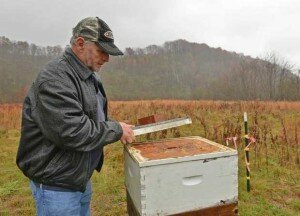

West Virginia Department of Agriculture Apiary Inspector Wade Stiltner. Photo by: Tyler Evert, Associated Press.
Some people in West Virginia think bees and honey production could be a viable option for transitioning former mined land into usable space. In Hernshaw, W.V., the state’s Apiary Inspector, Wade Siltner, watches over seven small bee hives on a former mountaintop removal site. The hives produced 400 pounds of honey is their first year.
… [F]or bees, which fly about 2 miles in any direction from their hives, the result sounds pretty good: expansive areas that coal companies restored, replanted and relined. They can grow young flowering plants and trees across hundreds of continuous square acres, all at once.
The mine sites could be turned into ideal locations for Appalachian honey production, a tradition that dates back generations in the region. And West Virginia hopes to expand their honey production while training out-of-work coal mines and veterans to become beekeepers.
West Virginia isn’t the only Appalachian state buzzing about honey bees on mine sites: “The Coal Country Beeworks program, which started in 2008 and uses various coal company partnerships and grants, includes 35 bee boxes at five mine sites and research with Eastern Kentucky University.”
That project was started by Dr. Tammy Horn, who is not Kentucky’s State Apiarist. “We don’t have to teach an appreciation for bees,” Horn said. “Many people already have it.”